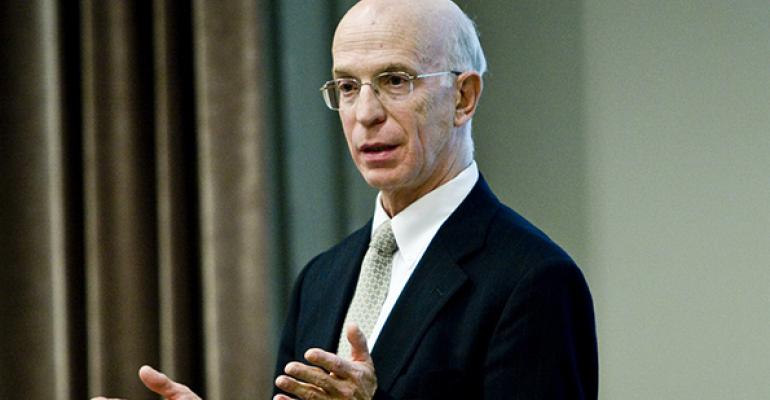Alan Blinder, the Princeton economist and former vice chair of the Federal Reserve, said the Federal Reserve may have a “cacophony” problem that could roil markets once the board ends its bond-buying program and begins the earnest debate around when to raise interest rates.
Blinder also said he’d prefer if more advisors fell under the fiduciary standard as opposed to the prevailing standard of suitability governing transaction-based brokers.
Speaking at the Investment Management Consultants Association annual conference in Boston on Sunday, Blinder said he felt there was no way to completely adhere to a fiduciary standard, but he’d “want to see the industry move in that direction.”
Blinder gave the opening keynote presentation of the IMCA conference Sunday night and said that he was more pessimistic than he was previously about the ability of the U.S. economy to achieve sustainable growth rates of 2.5 to 3 percent for 2014, given the disappointing report released last week showing the economy basically flatlined in the first quarter of the year.
While a bad winter was responsible for much of that retreat, and it is open to revision, it makes it even more unlikely the Federal Reserve will tighten up interest rates this year – current Federal Reserve Chair Janet Yellen suggested in her first public appearance that interest rates might begin to rise six months after tapering ends. “That seems too early to me,” Blinder said.
When the Fed does raise rates, what will it do with the engorged balance sheet the government has accrued after the period of sustained bond purchases? The balance sheet stands at some $4.2 trillion, compared to $900 billion before the Lehman bankruptcy. It won’t be possible to reduce that without selling, Blinder said. Some critics are concerned that once the Fed starts that process, it will roil markets. That’s unlikely, Blinder said. The sales will be orderly and without surprises.
Blinder said that while the banks are in far better shape today to handle a future financial crisis, Wall Street’s mode of self-regulation was a mistake. In addition, while financial institutions are far more prepared for a future financial crisis, we are vulnerable because other countries have not kept pace.
Blinder also pointed out the Fed’s power comes not from its statutory authority but from the fact that traders “dote” on its every word and the markets overreact.
And unlike when more domineering personalities like Alan Greenspan and Paul Volker headed the board, former chair Ben Bernanke ushered in a process more tolerant of dissent and open dialogue, greater transparency and a leadership-by-committee style. That’s for the better, Blinder said, but warned the board, split as it is between inflation hawks and doves with very different ideas about how the Fed should navigate the economy, suffers from a “cacophony problem” especially as it moves into the latter stages of tapering and considers when to lift the federal fund rate.
“In the summer and early fall, there will be only one thing on the mind of traders, and that is the Fed’s decision,” Blinder said. Unless the thinking behind that decision is crystal clear and unambiguous, markets will be prone to overreact. “The upcoming debate between hawks and doves” on the board of governors of the Federal Reserve is “a recipe to rattle markets.”





